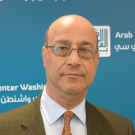Speakers

Rola El-Husseini
Associate Professor
Department of Political Science, Lund University, Sweden

Zena Wakim
International Lawyer; President of the Board
Accountability Now
Moderator
About the Webinar
On March 16, Arab Center Washington DC (ACW) held a webinar titled, “The Humanitarian Impact of Lebanon’s Deepening Crises.” Panelists were Rola El-Husseini, Associate Professor in the Department of Political Science, Lund University, Sweden; Patricia Karam, Non-resident Fellow at Arab Center Washington DC; Nabeel A. Khoury, Non-resident Fellow at Arab Center Washington DC; and Zena Wakim, International Lawyer and President of the Board of Accountability Now. Imad K. Harb, ACW Director of Research and Analysis, moderated the event.
Nabeel A. Khoury started off the discussion with a focus on the Lebanese state’s inability to provide basic services such as electricity, water, and sanitation. He argued that this failure is due to corruption and a lack of motivation at both the domestic and international level to do anything to solve the country’s many problems.
- Regarding the international community’s response, Khoury said, “The real humanitarian needs in Lebanon are going unfunded by the international community. Much of the aid that was promised by Europe, by the World Bank, the IMF, is all very conditional. And they’re conditional on things that Lebanon has proven incapable of providing.”
- On the path forward for Lebanon, Khoury stated, “What you need to do is to overturn the entire system. You cannot tinker with reforms along the edges of a system that has simply gone rotten to the core.”
Patricia Karam spoke about the broad sweep of Lebanon’s humanitarian crisis, pointing to hyperinflation, high unemployment, outmigration, the flight of capital, and shortages of food, fuel, and medicines. All of this, Karam said, was compounded by the 2019 protests, the COVID-19 pandemic, and the 2020 Beirut Port explosion.
- On the multiple challenges currently facing Lebanon, Karam stated, “There is no functioning government, there is a presidential vacuum, and political volatility has really increased tensions….Economic and state decay are really destabilizing the country’s political balance and the crisis is getting worse every day, [and] is really threatening to turn sectarian.”
- On the effect of the crisis on Lebanon’s cities, Karam said, “Rising poverty and despair has really changed cities which previously were generally safe. It has transformed them into ghost towns at night.”
Rola El-Husseini focused her comments on issues affecting women in Lebanon, including the country’s religious personal status laws and its nationality law, and both domestic violence and child marriage.
- On domestic violence in Lebanon, El-Husseini said, “After the financial crisis and the COVID pandemic, things have gotten worse for women. Like elsewhere in the world, the number of women hurt or killed by their husbands has recently increased.”
- On the way forward, El-Husseini stated, “The most important solution to end domestic violence and discrimination against women in Lebanon is the implementation of a unified personal status law devoid of any religious intervention.”
Zena Wakim described the crisis as one created by Lebanon’s elite, who have profited greatly from their position atop a political system made up of former warlords who extract profit from the population and the state and then funnel funds abroad.
- On the level of impunity enjoyed by the country’s elite, Wakim stated, “Why we see that level of impunity now is because we don’t have politicians here as we would…in the western world. It’s the former…warlords who after the [post-Lebanese Civil War] amnesty traded their guns for ties and declared themselves politicians. And they then wrapped the state around their interests, and they turned Lebanon into a host they could feed upon.”
- On the political elite’s purposeful extraction, Wakim said, “There is a complex set of factors that have been orchestrated and created…by the political elite to ensure this impunity and pillaging the state resources.”
Featured image credit: Shutterstock/Hussein Kassir



